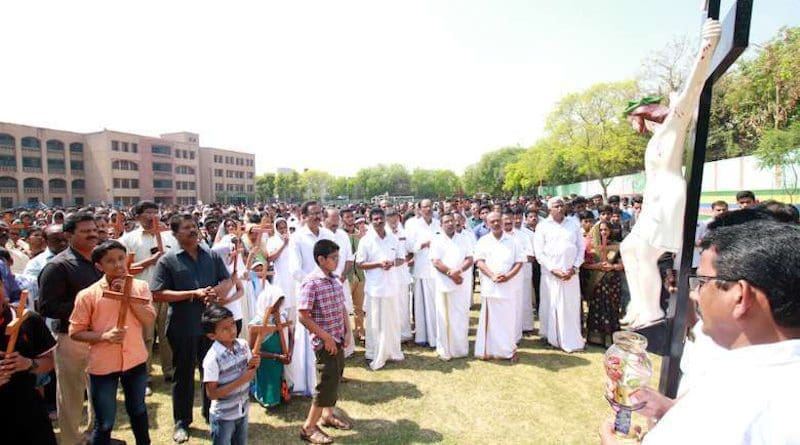Is Good Friday Still Good In India? – OpEd
By Dr. Fr. John Singarayar and UCA News
(UCA News) — Good Friday, a day of solemn reflection for Christians worldwide, commemorates the crucifixion of Jesus Christ. However, for Indian Christians — approximately 2.3% of the country’s population — this sacred day has been increasingly overshadowed by concerns about religious freedom and safety.
India’s Christian community has a rich history, traditionally believed to have been established by the Apostle Thomas in the first century. Today, Christians are concentrated in regions such as Kerala, Tamil Nadu, and the northeastern states. Despite their enduring presence, they have often faced marginalization as religious tensions escalate across the country.
One of the most pressing issues is the alarming rise in religiously motivated violence. The United Christian Forum documented 525 attacks against Christians in the first eight months of 2023, excluding incidents from Manipur, where hundreds of churches were destroyed during ethnic violence. In 2024, over 840 documented incidents occurred nationwide, with Uttar Pradesh recording the highest total with 209 cases.
These attacks — ranging from mob violence and church vandalism to physical assaults on priests, pastors, sisters, and worshippers — are often fueled by accusations of forced conversions, which Christian leaders consistently deny.
Anti-conversion laws enacted in several Indian states have worsened the situation. Ostensibly designed to prevent coerced conversions, these laws are frequently misused to target religious minorities.
The situation is further complicated by caste dynamics. According to Pew Research, 74% of Indian Christians identify with lower castes, including 57% who belong to scheduled castes or tribes. Their conversion to Christianity is often seen as a rejection of the caste system, causing tensions with upper-caste Hindus who perceive Christian missionaries as a threat to the social order.
For Indian Christians, the parallels between their suffering and that of Jesus are striking. Just as Jesus was persecuted for his teachings, many feel targeted for their faith. The message of Good Friday — that suffering can lead to redemption — resonates deeply with a community enduring trials for its beliefs.
The Church’s response has been one of resilience and peaceful resistance. In March 2023, more than 22,000 Christians gathered in New Delhi for a historic protest demanding action against the rising violence.
“We are not asking for anything extraordinary,” said Metropolitan Youhanon Mar Demetrios. “We just want the government to ensure that we can practice our faith without fear.”
Despite these appeals, the Indian government has been slow to address the issue. Prime Minister Narendra Modi’s Bharatiya Janata Party faces accusations of fostering religious intolerance. While Modi has occasionally spoken out against religious violence, his party’s Hindu nationalist agenda has emboldened extremist groups that perceive Christianity as a foreign threat to India’s cultural identity.
Good Friday takes on additional layers of meaning in this context. Just as Jesus was betrayed and crucified, many Indian Christians feel betrayed by a government that fails to protect them and condemned by a system that denies them justice. Yet the community remains steadfast, often holding services under security surveillance or in secrecy.
The resilience of Indian Christians exemplifies their commitment to nonviolence and forgiveness, even in the face of persecution. This reflects Jesus’ prayer from the cross: “Father, forgive them, for they do not know what they are doing.”
In a country where religious tensions frequently erupt into violence, the Christian community’s restraint testifies to the enduring power of Jesus’ message.
The United States Commission on International Religious Freedom has repeatedly designated India as a “Country of Particular Concern” because of its declining record on religious freedom. However, international pressure has produced limited results, and the on-the-ground situation remains precarious.
As we reflect on Good Friday in 2025, we must recognize its dual nature for Indian Christians — a day of profound spiritual significance that also highlights the ongoing struggles of a community fighting for its right to exist in peace. The crucifixion serves as a poignant metaphor for the sacrifices Indian Christians make today: sacrifices of safety, dignity, and sometimes life itself.
While Good Friday will always hold a special place in the hearts of Indian Christians, its observance is increasingly marked by tension. Yet in the spirit of Jesus’ teachings, Indian Christians persevere, believing that just as Jesus rose from the dead, their community too, will overcome its trials. For now, though, the question lingers: is Good Friday truly “good” for Indian Christians? The answer is as complex and multifaceted as India itself.
- The views expressed in this article are those of the author and do not necessarily reflect the official editorial position of UCA News.

